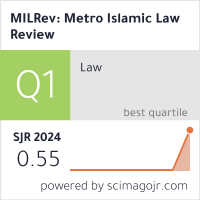Legal Policy for Women Workers in Indonesia: A Review of Contemporary Islamic Law
DOI:
https://doi.org/10.32332/milrev.v3i1.9023Keywords:
Contemporary Islamic Law, Legal Policy, Siyāsah Dusturiyāh, Women Workers.Abstract
The Indonesian government issued Regulation in Lieu of Law (Perppu) Number 2 Year 2022 on Job Creation by amending several contents of the regulation. After the issuance of the regulation, attention has been focused on the regulation of the protection of women in law. Therefore, this study aimed to determine the effect of Government Regulation on Job Creation regarding the welfare of women workers in the review of contemporary Islamic law through siyāsah dusturiyāh. The analysis was conducted through library study, using data sources acquired from the literature pertaining to the Government Regulation in Lieu of Law on Job Creation. The results showed that in contemporary Islamic legal study, the concept of siyāsah dusturiyāh emphasized policy formation to achieve benefits measured through Maqasid Shari'ah. According to Perppu, every citizen was able to secure employment and receive fair as well as dignified compensation and treatment in labor relations, including the protection of women workers. However, several aspects did not work in accordance with the objectives and had a negative impact on women workers. These included the threat of low wages, the expansion of the outsourcing system, and the obligation of prolonged leave, which no longer persisted. In this context, Perpu was not consistent with the purpose of the benefit of women workers.










